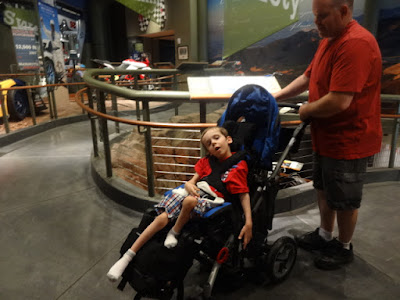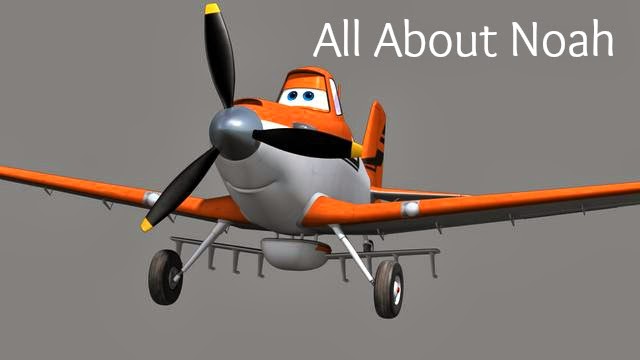We had a few hours before dinner after visiting the North Pole. We
decided we'd take a tour of the Penrose Heritage Museum which is on the
Broadmoor property. Noah's daddy has always loved cars and history so
he was naturally drawn to the museum. It was in walking distance from
The Cottages at the Broadmoor and the weather was comfortable.
Admission to the public is free and the museum's attendants were
welcoming upon visitor entry and happy to answer questions about the
museum's historical contents.
Spencer Penrose built The Broadmoor in 1918, and his widowed wife,
Julie Penrose, built
the original Carriage Museum which they now call The Penrose Heritage
Museum in 1941. The museum has 31 horse-drawn carriages and 13
motorized vehicles on display. The museum is home to two presidential
carriages, one belonging to President William Henry and the other
belonging to Chester A. Arthur. The museum also has authentic Native
American artifacts, and a giant wall full of riding track saddles, horse
harnesses and stirrups and antique firearms.
Chris was particularly interested in the Pike's Peak racing track and
map. And they had the wreckage from Jeremy Foley's 2012 mountainside
crash which was caught on video tape as it plummeted over the side of Pike's Peak. The crushed and mangled Mitsubishi Evo sits cradled in an
exhibit to reflect the crash with a video and interview from Jeremy
about the crash. Thankfully both driver and co-driver survived and
walked away from the crash, but it was one of this videos that watching
it leaves you feeling quite paralyzed with fear.


Chris and I both have a passion for racing. I think however
quarter-mile racing is about as daring as we get. You'd never get
either one of us to race on a mountainside. Nope, not ever. They call
the race the Pike's Peak International Hill Climb or otherwise referred
to as the Race to the Clouds. The race first started in 1916 and then
consisted of both paved and gravel sections. It is now fully paved, but
even still with a 156 turns on the mountainside... it's still a big
giant no for something we'd ever consider doing. Not the a race that is
on our bucket lists. But it remains a very popular race with 130
racers who compete annually. Hats off to all of them as I watch it
comfortably from the safety of my television.




Although I have a tremendous love for racing, I still was incredibly
drawn to the numerous carriages that filled the museum. Rich with
history I imagined what our lives might be like without automotive
transportation. Carriages are rather majestic and as they all sat
quietly in their display areas it was as if you paid attention long
enough each carriage wanted to tell you its own story. Some with
tattered and torn upholstery, distressed woods, and paint.




We called for a shuttle so we didn't have to walk back in the afternoon
sun with Noah, and thought we'd quickly take a tour of the upper level
of the museum. The item that most captured my attention exists on that
floor. It's an invalid chair. I walked around it multiple times
knowing that decades ago had Noah been born in that era that would be
what he would have had to use as a wheelchair. It was large, yet not as
archaic as one might imagine it to be. It could be either pulled from
the front or pushed by the back by a servant. One would lead you to
believe that someone with a disability needing use of an invalid chair
was rather well cared for. Yet, I'm sure that life was hard and history
tells us those with disabilities were not widely accepted nor favored. Someday decades from now Noah's wheelchair could also be sitting in a museum...




Noah looked at that chair as if he understood the history of the
invalid's chair too. A child so brilliantly aware and unable to
communicate his understanding to others without the assistance of modern
technologies. A child making his own history and leaving his imprint
on this world.
Love,
 Noah's Miracle
Noah's Miracle by
Stacy Warden is licensed under a
Creative Commons Attribution-Noncommercial-No Derivative Works 3.0 United States License.








































.jpg)
